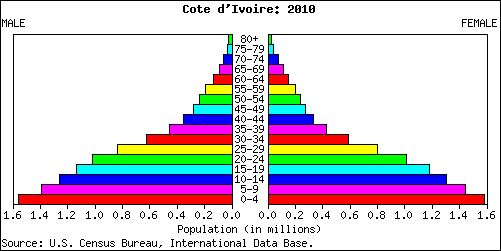Click on the image to view event details - or scroll to read the African News.
Ivory Coast " School Supply Program"
Our School Supply Campaign for 2013 is kicking off... this year we have targeted to equip 500 students in the Ivory Coast with all they need for the 2013 school year. We will keep you updated so stay tuned. This is one of many last year's recipients....
 The literacy rate for adults remains low: in 2000, it was estimated that only 48.7% of the total population was literate (60.8% of males and 38.6% of females). [1] Many children between 6 and 10 years are not enrolled in school.
The literacy rate for adults remains low: in 2000, it was estimated that only 48.7% of the total population was literate (60.8% of males and 38.6% of females). [1] Many children between 6 and 10 years are not enrolled in school.
Problems in education (Wikipedia)
During the early 1980s, Ivory Coast spent a higher share of its gross national product and of its national budget on education than any other country in the world. Although this served as an indication of the nation's high regard for education, expatriate teachers' salaries accounted for a disproportionate share of current expenditures, reducing the benefits to the nation itself. Generous scholarships for secondary school students also reduced funds available for younger children....
 The Ministry of National Education and Scientific Research assigned highest priority to problems of financing educational development and reducing the number of school dropouts. Computers and automated data processing equipment were being used By the late 1980s, the government was also producing its own text books, previously purchased in France, to reflect local rather than Foreign cultural values.
The Ministry of National Education and Scientific Research assigned highest priority to problems of financing educational development and reducing the number of school dropouts. Computers and automated data processing equipment were being used By the late 1980s, the government was also producing its own text books, previously purchased in France, to reflect local rather than Foreign cultural values.The internal efficiency of the education system was relatively low, partly because of the large number of students who repeated courses and the high dropout level. The number of school-aged children was expected to grow at an average annual rate of 4.3 percent by 1995, increasing the school-aged population by 50 percent. Unfortunately, teacher-training programs could not keep pace with these changes, and educational planners were in particular demand. The link between education and employment was also weak, exacerbated by the economic recession of the 1980s. Graduates, in effect, expected more than society could give them.


